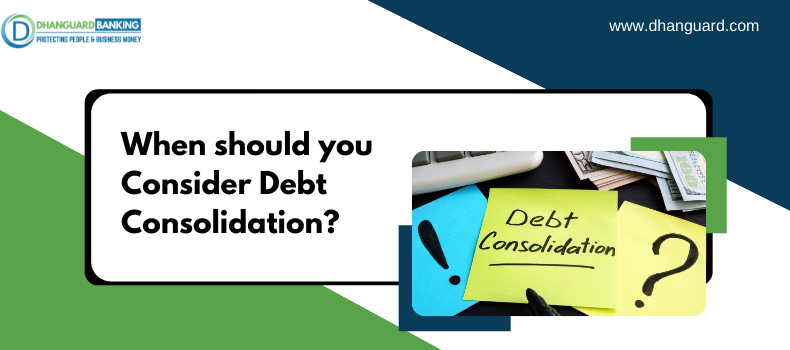The increasing debt can be difficult to repay, especially if the debt is divided into various credit cards and loans such as student loans, car loans, personal loans, and others. In many cases, people do not realize they have a debt problem until they are completely overwhelmed and unsure where to begin.
Debt consolidation is an option that can provide some relief from financial stress. It is the process of combining all of your smaller debts into one large debt. It has a single monthly payment and can be combined with other lower interest rate loans. In comparison to the individual bill payments, the single payment will have a lower interest rate. It will allow you to pay off the debt faster and with less money spent on interest. In this blog, we will go over everything you need to know about Debt Consolidation.
When is it Appropriate to Consolidate Debt?
When you have a large amount of debt and the interest rate payments are very high, it becomes very difficult to pay the principal and interest on all of your debts at the same time.
There are some simple ways to tell when you can consolidate your debts and when you can't
Struggling to Make Monthly Payments
If your debt problem is getting worse and you are having difficulty making payments, it is time to consolidate your debt. Everyone is in a unique situation with varying financial circumstances. When you choose debt consolidation, financial experts will recommend the best solution based on your needs. They make recommendations based on your needs, such as low monthly payments and a lower consolidated interest rate, which will make you less concerned about your monthly payments. You can improve your financial situation by having lower monthly payments.
Losing More Money on Interest Payments
When you pay loans and credit card bills, you will incur the additional expense of interest payments. Different banks provide different interest rates and timelines. Depending on the term of the loan, some loans may have higher interest rates while others may have lower interest rates. If you have credit card EMI payments, these interest rates will be added to your total payments. Every month, the borrower will pay more interest. The lender will profit from this interest component, while the borrower will lose money by paying higher interest. When you are paying a lot of money in interest, it is time to think about debt consolidation.
The interest payments you make will not help you pay down your principal loan balance. The less interest you pay, the more money you contribute to the principal payment. It is best to keep track of and review your loan repayment history.
The money you pay for the interest rate will eventually increase over time, while the principal loan amount will not decrease, which is not a good sign. Debt consolidation will help you get out of debt faster by lowering your interest rates.
Paying Off Several Debts
When you have a number of debts, such as student loans, personal loans, home loans, credit card payments, and loans from friends or family members. It is time to consolidate your debts if you are paying multiple bills. It is critical to determine which loans and debts can be consolidated. It is best to determine which financial institution offers debt consolidation services that are appropriate for your financial situation. The lender will verify the individual's financial capability, investigate the individual's background, and offer debt consolidation services. You will have more control over your payments if you have debt consolidation. Instead of making multiple payments each month, you will only have to make one.
Increase in Loans
You may have an increase in the number of loans in your life as a result of your financial responsibility. Banks provide top-up loans and additional loans, and you may occasionally receive good offers from different banks offering low-interest loans. You may have a need, and they may provide loans; as a result, the number of loans may increase over time. When you find yourself in this situation, you may decide to consolidate your debts with the lender.
Debt Consolidation and Credit Score
Financial institutions will verify a number of factors before deciding whether or not to offer you debt consolidation. Among other things, lenders look at your credit score to see if you qualify for debt consolidation. Aside from credit score, factors such as payment history, lender and borrower relationship, credit worthiness, and asset back up, and good financial records all play a significant role in determining debt consolidation qualification.
It's always a good idea to check your credit score, and you should be aware of how much you're paying each month. Checking your credit score will allow you to determine how much debt consolidation you are eligible for.
Some lenders offer debt consolidation to borrowers with bad credit. Other factors are taken into account, and the lender wants to be certain of future payments. Credit scores are based on past events however, financial institutions also take into account future repayment capacity. They will provide a loan to a borrower if they are assured of repayment capacity. This, moreover, is not a guarantee, approval may be at the discretion of the lender.
Conclusion
Having a solid plan for overcoming financial debt will allow you to benefit from debt consolidation. If you fall behind on additional debts, you will be stuck in a never-ending cycle of repayments. Make a budget and stick to it when it comes to debt repayment. You can overcome the financial burden if you effectively manage your finances.
Aside from that Dhanguard will help to make it simple for you to overcome from your financial debt. For more information regarding the Debt Consolidation contact to Dhanguard we will gladly assist you in every aspect.



